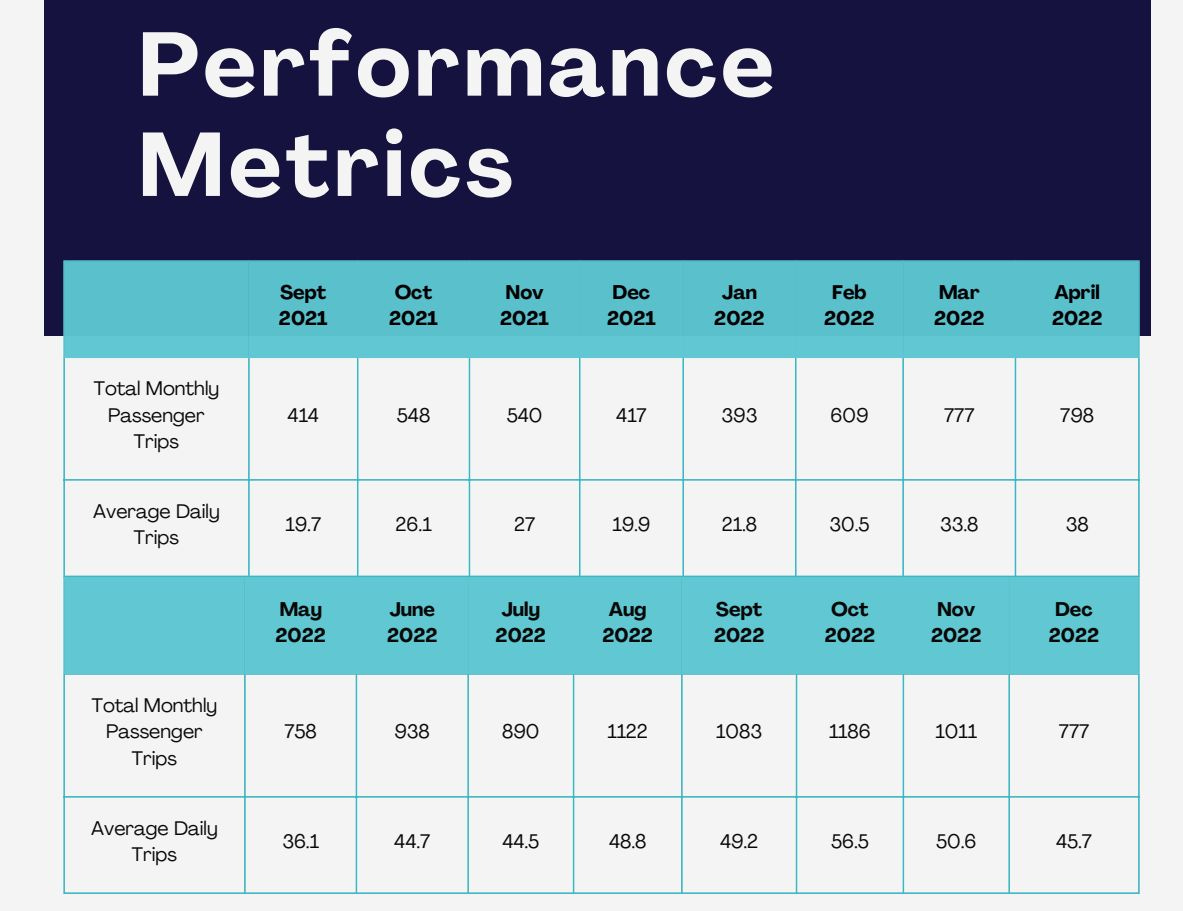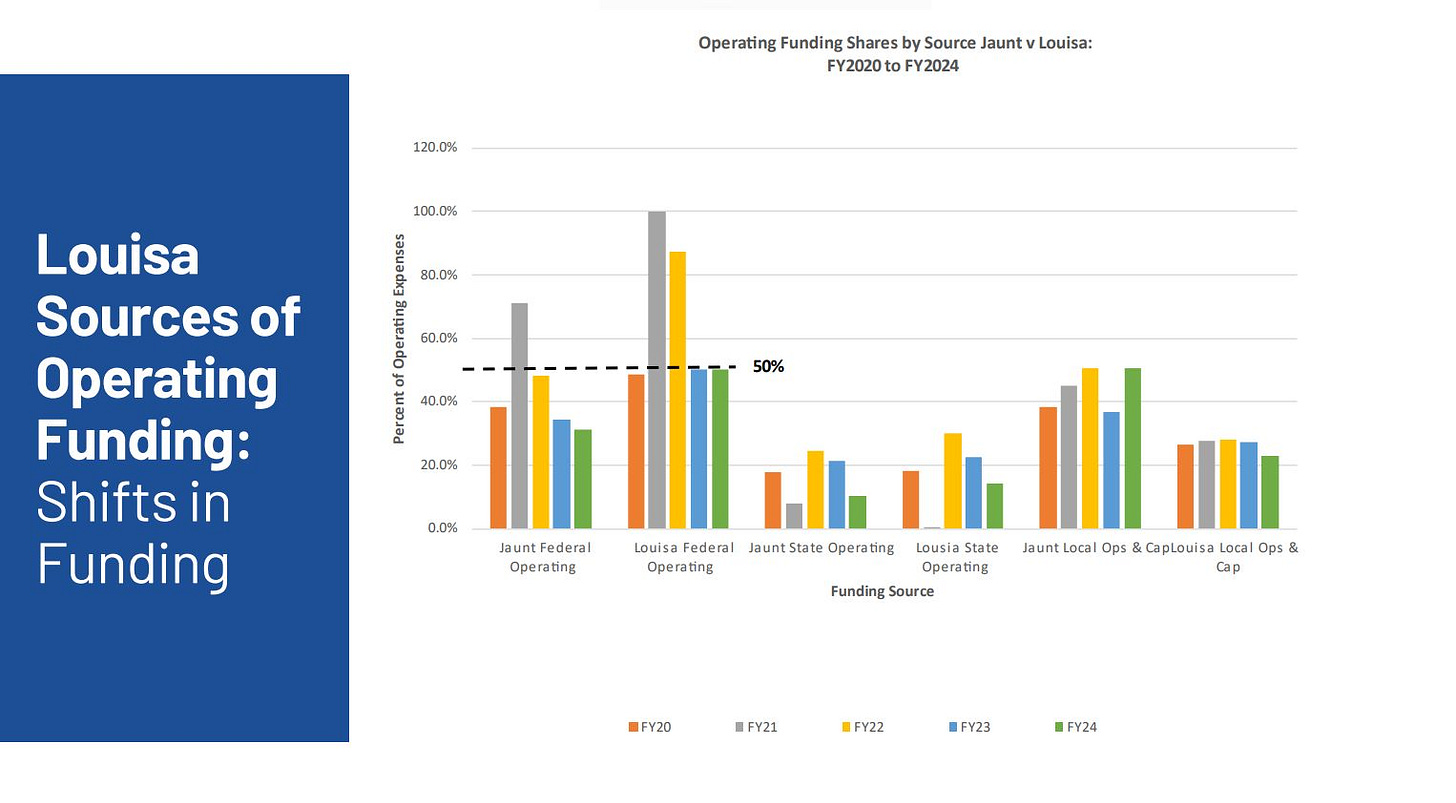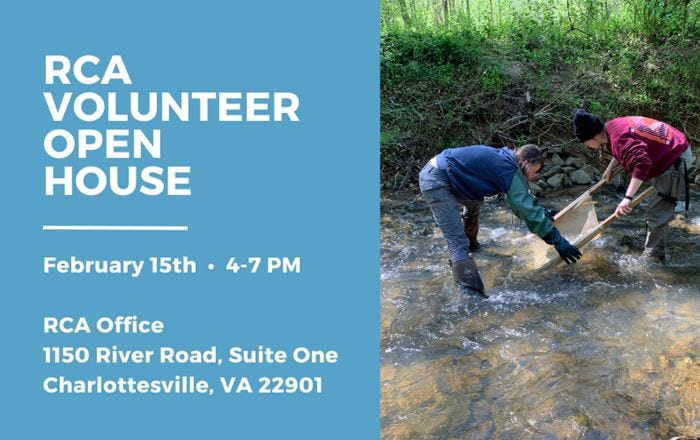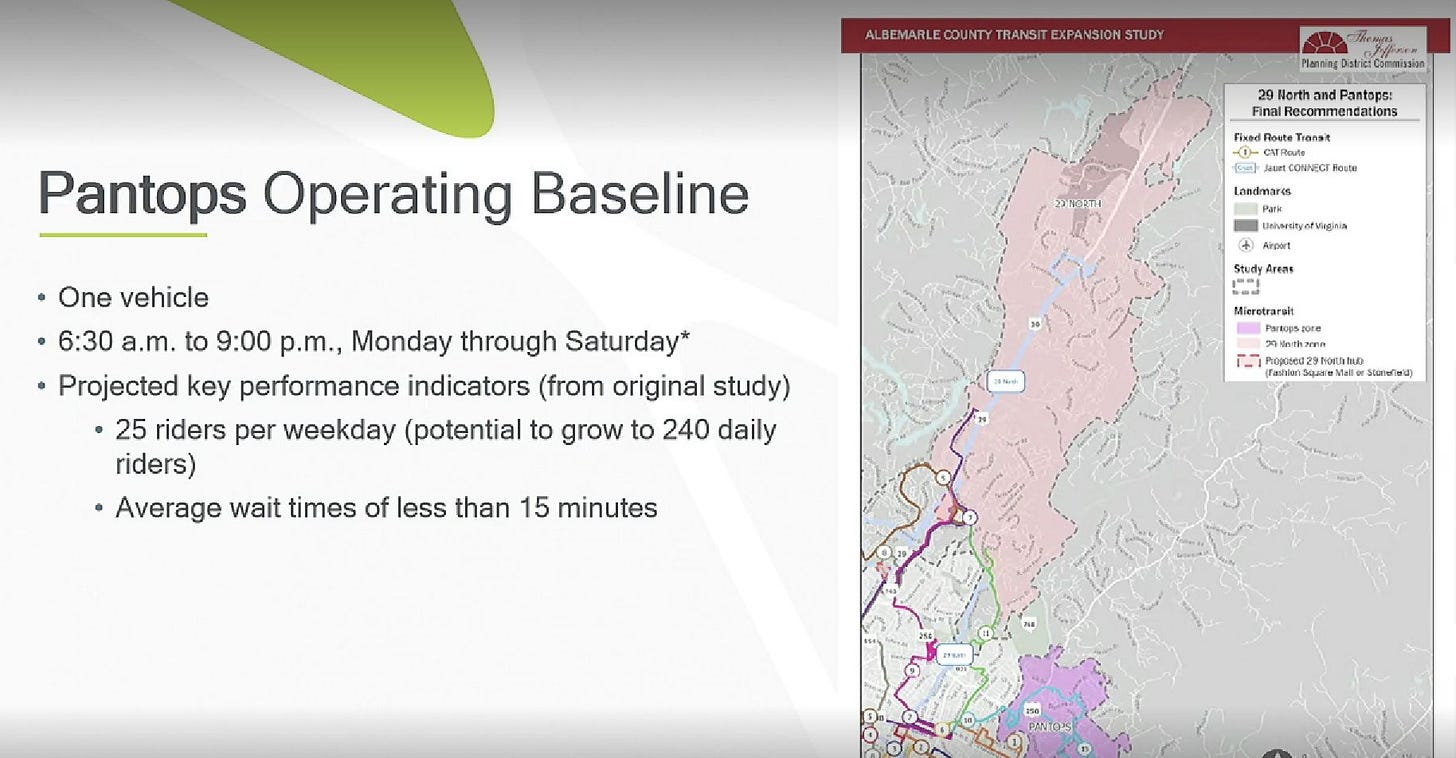How do the wheels of the bus go round? How is the community squaring a desire for a more robust public transit system with the existing logistics? There are no direct answers to those questions in this or any other edition of Charlottesville Community Engagement, but this particular episode will inform you of some current thoughts by movers and those who tell the movers what to do. I’m your host, Sean Tubbs, somehow remembering a Ratt song… what comes around goes around. But will it get you there on time?
On today’s program:
A brief summary of who’s who and what’s what in area transit providers
The Afton Express reports on ridership in its first 16 months of operations and looks ahead to the future
The CEO of Jaunt provides a glimpse into how it is recovering from recent funding errors caused by potential mismanagement
Albemarle School transportation is raising the bar on driver pay
The University Transit Services talks about their current night pilot and need for drivers
Charlottesville Area Transit briefs the Albemarle Board of Supervisors on its contract to provide microtransit service later this year
First shout-out goes to Camp Albemarle
Today’s first subscriber-supported public service announcement goes out to Camp Albemarle, which has for sixty years been a “wholesome rural, rustic and restful site for youth activities, church groups, civic events and occasional private programs.”
Located on 14 acres on the banks of the Moorman’s River near Free Union, Camp Albemarle continues as a legacy of being a Civilian Conservation Corps project that sought to promote the importance of rural activities. Camp Albemarle seeks support for a plan to winterize the Hamner Lodge, a structure built in 1941 by the CCC and used by every 4th and 5th grade student in Charlottesville and Albemarle for the study of ecology for over 20 years. If this campaign is successful, Camp Albemarle could operate year-round. Consider your support by visiting campalbemarleva.org/donate.
An introduction to this installment
Today’s edition is a little different. I’ve written about transit planning in this community for many years and was present at a February 2008 meeting of the Albemarle County Board of Supervisors and the City of Charlottesville where they heard from consultants who suggested the creation of a Regional Transit Authority. For various reasons, the idea was shelved but came back in the form of a Regional Transit Partnership. That group has met since the fall of 2017 to talk transit.
Here are some highlights of where we are right now:
Charlottesville Area Transit continues to be a six-day a week service due to staffing shortages caused by the pandemic that remain challenging despite a raise for starting drivers and mechanics to $21 an hour. Route changes for the city-owned service went through a public process in 2021, but implementation remains delayed.
Jaunt continues to rebound from allegations of fraud and misuse of public funds by its former CEO. Those allegations forced Jaunt to receive less funding for a time but new CEO Ted Rieck recently made the rounds of local governments to speak of the agency’s plans.
The University Transit Service continues to be a separate entity that exists to serve students, faculty and staff in a highly concentrated area. UTS receives no federal funding and its schedule depends on whether the University of Virginia in session.
There is an ongoing study to recommend a governance structure for an expanded regional transit system. More on that as we go through this newsletter.
Now, to some individual stories.
Afton Express to expand service in 2023
One of the topics discussed over the years at the Regional Transit Partnership has been planning for new service in the Staunton area and the Charlottesville area. The Afton Express launched on September 1, 2021 and the Central Shenandoah Planning District Commission recently issued an annual report for the first 16 months of service.
“Despite launching the service in the midst of a global pandemic when many commuters were working from home, a small group of dedicated riders showed up and have continued riding ever since,” reads the executive summary of the report. “This group of passengers grows each month.”
In all, 12,261 people used the service from September 2021 to the end of last year. On the western side of the mountain. the most popular pick-up spots are the Waynesboro Park and Ride Lot and the Staunton Mall. On the eastern side, Central Grounds Garage and the UVA West Hospital Complex.
Fares are $3 one way, or $25 for ten rides.

The report also explains how service times were adjusted to reflect an increase in traffic as the pandemic continued to recede last spring. The report also looks ahead to the future with an expansion of service as well as a conversion from start-up funds for a demonstration to recurring funding through the section 5311 formula. Afton Express is part of the BRITE service and the idea is this would become another of their regular routes.
“The expansion will add a third bus into the rotation to increase frequency of service. With additional stop times in Charlottesville and adding a fifth trip in the evening, Afton Express will be able to serve more commuters with schedules outside of the traditional 9:00 am to 5:00 pm work hours.”
Interested in checking out the service? They started a new schedule on Monday. Take a look and let me and others know what you think.
Jaunt provides update at Regional Transit Partnership
Yesterday I got an email that the Regional Transit Partnership for February has been canceled. So, let’s quickly go through some of the highlights of the January 26 meeting. Charlottesville Area Transit Director Garland Williams was not present, nor was one of Albemarle’s Deputy County Executives. We’ll hear from them later.
Every single meeting of the RTP begins with a chance for people to speak out about transit-related issues. At the January meeting, the town manager of Scottsville put in a word for Jaunt, the only transit service to serve his community and Buckingham County.
“I just want to represent the Scottsville neighbors who rely on this service,” said Matt Lawless. “Elders going to appointments and the few younger commuters who are really happy to use Jaunt regularly in their commuter service.”
That cued up an update from Jaunt to begin the year. Jaunt is a public service corporation with stock held by five area localities. (view the presentation)
“Our organizational structure is the same as [Greater Richmond Transit Company] in Richmond,” said Ted Rieck, the CEO of Jaunt. “We think we’re a good investment. Other studies have shown that every dollar spent on transit turns over seven times in the community.”
Rieck does not shy away from acknowledging a rocky few years for Jaunt.
“Jaunt has been set with challenge over the last couple of years,” Rieck said. “That’s no news. A couple of years ago the agency became embroiled in controversy with staff members that made some bad decisions.”
One of those was to mix federal funds for rural service with federal funds for urban service. The Federal Transit Administration penalizes such actions. This will have a strain on the ability to purchase new rolling stock that serves the rural area. Rieck said a future Regional Transportation Authority will have to contend with many of these same issues.

Jaunt is planning for the future by being ready to provide microtransit service, planning for the use of alternative fuels, and recovering ridership that is still rebounding post-pandemic. They have applied for a grant to begin implementing the recommendation of a committee that suggests going electric is the answer for fixed-route service.
Albemarle Schools continues to seek ways to address drive shortages
One of the main issues facing any transit agency is the shortage of drivers. That’s certainly the case for pupil transportation at Albemarle County Public Schools. Charmane White is the director of transportation and she said her team is preparing a strategic plan to address the issue.
“Part of that recruitment and retention, as you know, is that we went up to $21.50 an hour,” White said.
White said the system has also implemented a step scale for experienced drivers and one plan is to let people know of the potential.
“Meaning we have drivers now making $32, $35, $38, $40 an hour because of their years of experience,” White said.
Another component will be outsourcing of pupil transportation to private companies. White said employees have some trepidation.
“This doesn’t mean we’re eliminating jobs,” White said. “Absolutely not. What we’re trying to do is give some relief for our employees. Right now they’re doing a lot of double-back runs and I’m trying to figure out a way how I can help.”
One request for quotations that’s currently out there is for buses that can transportation grade 3 elementary students to a field trip to Amazement Square in Lynchburg this March. (view the RFQ)
White said the fleet now has two electric buses which are soon going to be put on the road. They have also added more 14-passenger buses which do not require a commercial’s driver license.
UTS continues night-service pilot, should receive four electric buses this year
The University Transit Service offers 15-minute headways while school is in session. Last year, the service began to offer some late-night service. Kendall Howell is the assistant director of UTS.
“We run one route that kind of goes through most popular areas like the library, the Corner, the dorms,” Howell said. “And then we run what used to be known as Safe Ride but it has been rebranded as UTS On-Demand.”
Howell said that more data on the service will be brought before the Partnership in the future. He added that UTS has four battery-electric buses on order and they will be available this summer.
“But we’ll have a ribbon-cutting probably in September or October and we hope those buses join our service before the end of the year,” Howell said.
Howell said UTS also suffers from driver shortages and needed 12 additional drivers as of the January meeting of the RTP. He said UTS recognizes the important role that drivers play.
“The main thing I think for me is this concept of elevating the bus driver in the public consciousness from sort of an entry level position to a trade, a trade that you choose along the level of an electrician or a plumber,” Howell said.
A brief CAT update
The update from Charlottesville Area Transit was given by Juwhan Lee, the agency’s assistant director. He said ongoing studies include an alternative fuels study, a transit strategic plan, as well as planning for microtransit. We’ll hear more about microtransit in a moment. But the biggest issue is the lack of drivers and Lee said the city will pattern a similar program to Albemarle’s step scale program.
Lee also said the city would like to hire third-party vendors to help with its driver shortage for the school system as well.
Governance study update
Work continues on a study for what it would take to bring all of the various transit agencies under one umbrella, even if just for the purposes of securing more funding. The firm AECOM is receiving $150,000 for the work.
There will be a more full update at the March meeting of the Regional Transit Partnership, but if you want to know more background, I’ve got you covered:
Regional Transit Vision update, May 20, 2022
Partnership briefed on potential vision for regional transit, June 1, 2022
Albemarle and Charlottesville officials weigh in on Regional Transit Vision, June 14, 2022
Council considers spending $30K toward governance study; Jaunt hopes to play a role, September 23, 2022
Charlottesville Area Transit to operate on-demand demonstration project in Albemarle, August 24, 2022
Governance study: A primer on regional transit systems, December 15, 2022
Stories could be written about the cumulative price of all of this planning. Will any of it ever come to pass, or is it make-work? It’s not my job to answer that last question, but I do remind you I was in the room on February 11, 2008 when I was so much younger then, but I’m older than that now.
Second shout-out: Rivanna Conservation Alliance
In today’s second Patreon-fueled shout-out, interested in helping a local organization keep our local river clean and protected? The Rivanna Conservation Alliance is holding an open house on Wednesday, February 15 at their offices on River Road in Charlottesville. Come by anytime between 4 and 7 p.m. to learn about their programs and the many ways you can get involved. Staff will be on hand to share information about monitoring, restoration, education, and stewardship activities. New and current volunteers are welcome! Light refreshments will be provided. Visit rivannariver.org to learn more.
Planning continues for CAT to run microtransit in Albemarle County
Charlottesville Area Transit has a contract to work with Albemarle County to provide microtransit service in the area along U.S. 29 in the urban ring as well as in the Pantops area.
“Microtransit is an on-demand transportation solution really being implemented across the nation and here in Virginia,” said Jessica Choi, a transit planner with the firm Kimley Horn. “Folks can make real time trip requests and those trips are dynamically routed and programmed through the application and the vehicle is dynamically routed to serve those trips.”
Microtransit is seen as a way of providing an alternative to driving for people who live in Albemarle’s growth areas.
In January, the Board of Supervisors got an update on how preparations are going for service to begin later this year.
Last year, the Board of Supervisors agreed to apply for a grant from the Virginia Department of Rail and Public Transportation to find a one-year pilot of the service.. That’s similar to the pilot for the Afton Express. The idea was to provide service in Pantops and U.S. 29.
“We funded our portion of the grant and Charlottesville Area Transit made application for this pilot program and it was awarded last summer,” said Deputy County Executive Trevor Henry at the January 18, 2023 meeting of the Albemarle Board of Supervisors.
The total amount of the grant to Charlottesville Area Transit is for $1.94 million, including a match from Albemarle of $388,000. The service is owned solely entirely by the city of Charlottesville.
CAT hired the firm Kimley Horn to provide logistical support to get the project up and running.
“Kimley Horn was brought in to augment CAT staff, to evaluate the program, best practices, options as far terms of implementation with a focus on execution and customer experience in these two areas,” Henry said.
This service would operate as a CAT-branded service according to Choi.
“One of the things that we did want to make clear to you all and about this service is that this microtransit service and the operator will be operating under the CAT umbrella of services and not be its own standalone entity,” Choi said.
The service on U.S. 29 would operate from 6:30 a.m. to 9 p.m. Monday through Saturday and would feature three vehicles which are much smaller than the large buses used on fixed-route services.
“The projected riders per weekday is 75 with the potential to grow to 360 daily riders and an average wait time for riders of less than 15 minutes,” Choi said.
There would be only one bus for Pantops which would operate on the same schedule. The projected number of riders is 25 a day with a growth potential to 240.
Charlottesville Area Transit will issue a request for proposals for a third-party to provide the microtransit service.
“And then the [request for proposals] will come back as part of our finals and hopefully come back to the Board hopefully in April or May timeframe to kind of give you a detailed analysis of where we are,” said Garland Williams, the manager of Charlottesville Area Transit.
Williams said a date for when the service will launch depends upon the results of the RFP. There are many different components.
“So the software implementation, that could take anywhere from four to six months for implementation so whoever we procure as an operational partner, the implementation from installation to testing and training could take four to six months to make sure we work out all of the bugs,” Williams said.
Then there’s an open question of what the fare would be if one is charged. CAT is currently operating fare-free through a grant from the Virginia Department of Rail and Public Transportation. He said because CAT doesn’t charge now, adding a fare for microtransit could trigger a need for federal review of compliance with the Civil Rights Act in a process known at Title VI.
The budget for the grant also includes $135,000 for marketing and advertising to make sure people know about the service.
Supervisor comments
Supervisor Diantha McKeel has been a member of the Regional Transit Partnership since it was formed in 2017. She said it is critical that CAT and Albemarle pull this off.
“Whether or not our community chooses to use this pilot will determine the interest in transit ridership in our community, so it’s critical,” McKeel said.
McKeel added that she felt the hours were too limited and might not work for people who work at Sentara Martha Jefferson Hospital. Henry responded that the hours were those that were specified in the grant application.
“As we experience the project, we certainly could look to expand it if it is successful,” Henry said.
Williams said the RFP could be set up with a foundation of the stated hours but an add-on could be listed for additional housing.
McKeel said she was concerned about having the service branded as Charlottesville Area Transit.
“Based on what has happened with the pandemic and the decrease in ridership and the struggle around bus drivers in our community, many folks have an impression that CAT… they struggle with CAT,” McKeel said. “Let’s talk about it. Let’s face it. And I have a lot of folks who say CAT is not reliable in my urban ring. How are you going to address that if the microtransit service is labeled CAT?”
Williams said that marketing will help with that service, and that the third-party service would be responsible for staffing and providing the vehicles.
“From the community standpoint, when they call that number, that will be a dedicated group of drivers that are dedicated strictly to microtransit and it won’t be pulling from the existing numbers of drivers,” Williams said.
Williams added that microtransit drivers do not need a commercial driver’s license, so that will open up the potential pool of applicants.
Supervisor Jim Andrews said he was concerned that if the ridership doesn’t materialize, the cost could be expensive.
“A quick calculation based on the 75 plus 25 is 100 riders per day, and if that’s six days over 50 or 52 weeks, that’s about 30,000 trips a year,” Andrews said. “When you consider the amount of money being put into it at about $75 per trip if it is not scalable.”
Williams said that is a valid concern but he believes there is pent-up demand on the U.S. 29 and Pantops corridors that will lead to higher ridership than the conservative estimates included in the original study that led to the DRPT project.
“I think those numbers are kind of the floor but I don’t think those are the ceiling,” Williams said.
Supervisor Ann Mallek said she wanted whatever firm is hired to have a track record for delivering this service already and not learning how to do it at Albemarle’s expense. She said she’s also concerned about lack of service on Sunday service.
“It is a real burden for people who get off shift and its dark and it is raining and they’re walking down U.S. 250 to get home, and that’s really hard on a Sunday,” Mallek said. “And we’ve certainly heard about that circumstance both to the hotels and hospitality locations as well.”
Currently CAT is not offering any Sunday service and has not done so since the pandemic due to driver shortages.
Supervisor Ned Gallaway said he’s supportive of the pilot because he doesn’t think fixed-route transit will work on U.S. 29. For instance, how would that ever help someone get from Woodbrook to the Rio Hill Shopping Center without a car?
“When [Fashion Square Mall] was a vibrant location and you could get people from downtown to the Mall and vice versa, that was an effective fixed-route,” Gallaway said.
Gallaway was fine with going fare-free but riders should be asked what they would be willing to pay. He said he just wants it up and running.
“This speaks to our climate action policy, this speaks to helping eliminate traffic congestion,” Gallaway said. “This helps with economic development because more people could be out and moving around in the local economy spending their dollars where they are going.”
How will it all turn out? How will you know? Charlottesville Community Engagement will strive to tell you the story.
Reading material for when you’re on transit:
FRA To Expand Passenger Rail Grant Amount, AASHTO Journal, February 2, 2023
Housekeeping for #497
This is perhaps the longest stretch between two podcasts in a long while. Part of this is due to a trip I took last week in which I did not take everything I needed. Part of this is due to a quick illness I seem to have contracted on Sunday. And part of it is because I wanted to do a transit edition. I also disclaim I briefly worked as an advocate, and part of that time I spent trying to get people to use the bus.
Since the pandemic, I stopped being a regular rider as I work from home, but I’m still interested in how the various policies come together, or don’t come together. Transit is often seen as the solution to congestion that comes with more people living in the community, but who is going to make sure that all of the visions come to pass?
This newsletter is the only information outlet that seeks to cover transit as a beat, and it’s just me doing the work. Do the things that get announced at meetings come to pass? There’s so much to write about and that’s what I intend to keep doing.
But I need your help. Not just in the form of new paid subscriptions to this newsletter via Substack, but I need your perspective. What do you think? What are the barriers that keep you from getting on a bus? That’s an ongoing conversation and one day I’ll figure out how to include more of your voices in this podcast.
For now, it’s on to the next one. So this one ends with a notification that Ting will match your initial Substack subscription. That’s a big deal because it allows me to keep paying my bills. I am not a non-profit and and I will not seek grant funds. Doing so allows me to be independent. It’s only me who decides what I write about, and this time, I felt it was important to write about transit.
What about Ting? Well, if you’re looking for high speed Internet, consider signing up.
If you sign up at this link and enter the promo code COMMUNITY, you’ll get:
Free installation
A second month for free
A $75 gift card to the Downtown Mall
Thanks for Wraki for music and the Fundamental Grang for whatever it is that that entity does.

















Share this post